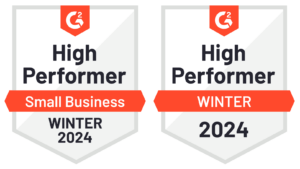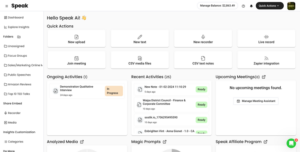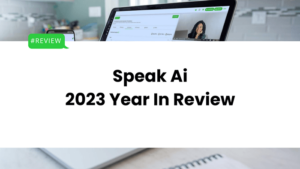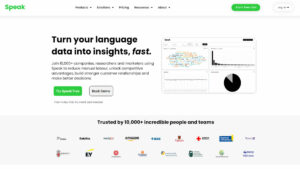
What's New In Speak - April 2024
Interested in What's New In Speak February 2024? Check out this post for all the new updates available for you in Speak today!
Focus groups are a common tool used by organizations and companies to research, assess, and evaluate customer opinions on products, services, or ideas. They are usually composed of 8-12 people and are led by a moderator who is responsible for directing the conversation. The focus group method can be an effective way for organizations to better understand customer needs and preferences but there are both advantages and disadvantages associated with using this technique.
One of the main advantages of using focus groups is that it allows organizations to get direct customer insight into the product or service they offer. By listening to customers’ feedback, companies can gain valuable insights into what consumers think about their products or services and make improvements accordingly. This information can be used to inform marketing campaigns as well as product development strategies in order to better serve customers’ needs.
Focus groups are also advantageous because they provide quick results that can be used in decision-making processes within an organization. These results can be used right away instead of waiting for weeks or months for other types of research methods such as surveying or interviews to show results. This makes it easier for companies to make informed decisions in a timely manner without having to wait around or spend extra money on costly research methods.
Focus groups are often more cost-effective than other traditional research methods such as surveys or interviews because they allow organizations to gather information from multiple sources at once which ultimately saves time and money in the long run. Additionally, focus groups don’t require any special equipment since all that is needed is a space where the group members can meet and discuss their opinions on various topics related to the product or service being assessed.
Another advantage of using focus groups is that they allow members of an organization such as marketing professionals or product developers to come up with creative solutions based on customer feedback and suggestions from the group members themselves which can lead to innovative ideas and solutions for problems facing an organization's products or services
One disadvantage associated with focus groups is that group dynamics can influence the outcome of the discussion if not managed properly by a trained moderator who understands how group dynamics work within a discussion setting. For example, some members may dominate conversations while others may feel uncomfortable speaking up due to shyness which could lead to biased results if not monitored closely by someone familiar with managing these types of discussions.
Another downside associated with focus groups is that they take longer than other traditional research methods such as surveying which usually only takes minutes whereas focus groups may take several hours depending on how many participants there are and how long each session lasts. Additionally, if not managed properly, discussions could become derailed leading participants down various tangents which could waste valuable time that could have been spent discussing more relevant topics related to assessing customer opinions.
A third disadvantage associated with focus groups is their limited scope. Since these types of discussions typically involve 8-12 people, it’s difficult for organizations to get a complete picture of what customers think about their products since this sample size does not represent all possible customers out there. Additionally, due to its small scale, it’s more difficult for companies trying to use this method in order to gain insights into deeper topics such as consumer behavior patterns since participants may not have sufficient knowledge on certain topics discussed during sessions which limits further exploration into certain areas related product development.
Focus group discussions offer organizations valuable insights into what customers think about their products or services but it’s important to understand both its advantages and disadvantages before deciding if it’s the right method used when researching customer opinions. By understanding these pros and cons, businesses will be able to make informed decisions when determining whether use this technique within their organization.
Get a 7-day fully-featured trial.


Interested in What's New In Speak February 2024? Check out this post for all the new updates available for you in Speak today!

Interested in What's New In Speak February 2024? Check out this post for all the new updates available for you in Speak today!

Interested in What's New In Speak February 2024? Check out this post for all the new updates available for you in Speak today!

Thank you for continuing to be part of this journey - it means the world to us. Below is a summary of our 2023 at

Interested in The Best Executive Research Firms? Check out the dedicated article the Speak Ai team put together on The Best Executive Research Firms to learn more.

Interested in The Best Consumer Research Firms? Check out the dedicated article the Speak Ai team put together on The Best Consumer Research Firms to learn more.

Powered by Speak Ai Inc. Made in Canada with
Use Speak's powerful AI to transcribe, analyze, automate and produce incredible insights for you and your team.